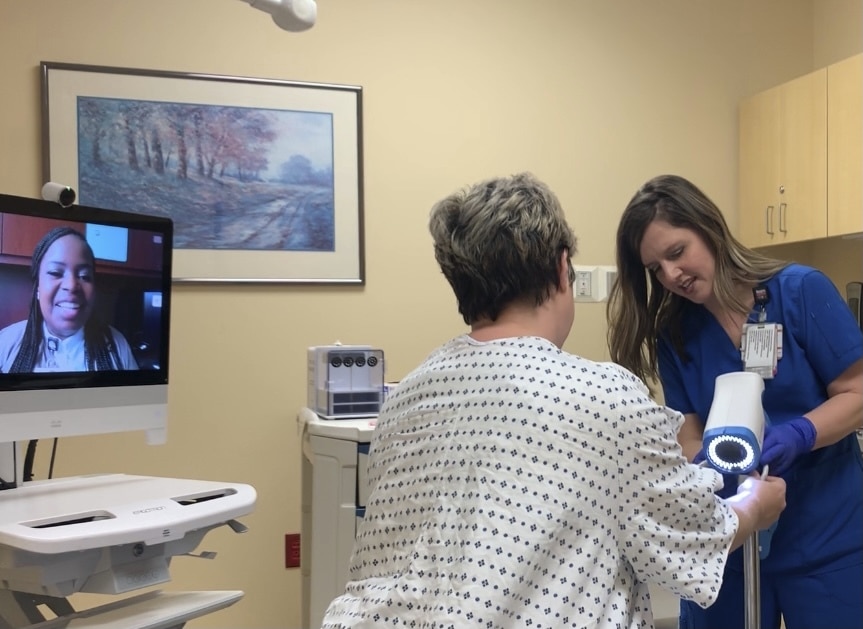View Larger Image

At a 2020 mock simulation video recorded exam, Ashley Connors, RN (left) acts as consultant and walks acting spoke site nurse Rhiannon Zerbe, RN (right) through a medical forensic exam.
Image by Courtesy TeleSANE
UAMS Receives AAMC Telehealth Equity Catalyst Grant for Sexual Assault Nurse Examiner Program
| The University of Arkansas for Medical Sciences (UAMS) Institute for Digital Health & Innovation recently received a $15,000 Association of American Medical Colleges (AAMC) 2022 Telehealth Equity Catalyst Awards and Pilot Grant for its sexual assault nurse examiner program.
The grant supports TeleSANE, a program of the Institute for Digital Health & Innovation that offers a specialized, 24/7 digital health service for sexual assault survivors. Launched in 2021, this unique care platform will be part of the Sexual Assault Assessment Program in emergency departments and crisis centers across the state.
“We are pleased to receive this recognition from the AAMC,” said Joseph Sanford, M.D., director of the UAMS Institute for Digital Health & Innovation. “The TeleSANE program increases accessibility to expert resources and allows us to provide sexual abuse survivors with the care and support they need.”
The program assists emergency departments in rural and underserved communities by providing sexual assault nurse examiners (SANEs) through teleconferences. These nurse examiners interact with distant hospital staff through real-time video consultations and guide them in collecting evidence, conducting medical-forensic examinations, recommending counseling and connecting patients to additional resources — all at no cost to the patient. Arkansas has only eight certified SANEs to assist sexual assault adult survivors, and this program helps equalize access to care.
TeleSANE will use the grant funding to build strategies to self-sustain and expand the federally funded program. This will include evaluation processes and needs assessments that will help TeleSANE leaders better understand the needs of local and state law enforcement, prosecutors, and the state crime lab. Using these findings, the program can be tailored to maximize its benefits to health care, law enforcement and survivors throughout Arkansas.
“In 2021, the AAMC launched the first Telehealth Equity Catalyst Awards to identify and highlight academic health systems that were directly addressing barriers to care via telehealth and improving care through both clinical delivery and medical education, particularly for underserved communities,” said Rosha McCoy, M.D., acting chief health care officer for AAMC. “Over the past year, we’ve worked closely with these health systems to understand the challenges, the solutions and how we can spread innovative programs. I’m excited to see this community grow and look forward to continued partnership with our new cohort of recipients.”
The grant recognizes the efforts of member institutions that are advancing health care equity through digital health and health technology in new and effective ways. Awarded programs demonstrate a positive impact on digital health and health technology barriers through clinical delivery and medical education.
Through its Office for Victims of Crime, the U.S. Department of Justice awarded UAMS a three-year, $4 million grant in 2019 to establish TeleSANE, which was initially scheduled to start in 2020 but faced delays due to COVID-19. HRSA, the Health Resources and Services Administration agency in the US Department of Health and Human Services, awarded the program a three-year, $1.5 million grant in July 2022.
Various UAMS digital health programs and rural sites have collaborated to implement the TeleSANE program, which will also include activities and outreach opportunities to educate their respective communities on sexual assault. To date, TeleSANE has launched 13 of 73 planned sites across the state and has received more than 110 consult requests for assistance related to medical-forensic exams in the past year. Once the program is fully implemented, any sexual assault survivor in Arkansas will be within a one-hour drive to a TeleSANE site.
TeleSANE uses UAMS e-Link, the statewide digital health network, to ensure privacy and protection for storage of images and information if a patient requires transfer to another facility.
The AAMC leads and serves the academic medicine community to improve the health of people everywhere. Founded in 1876 and based in Washington, D.C., the AAMC is a not-for-profit association dedicated to transforming health through medical education, health care, medical research, and community collaborations.